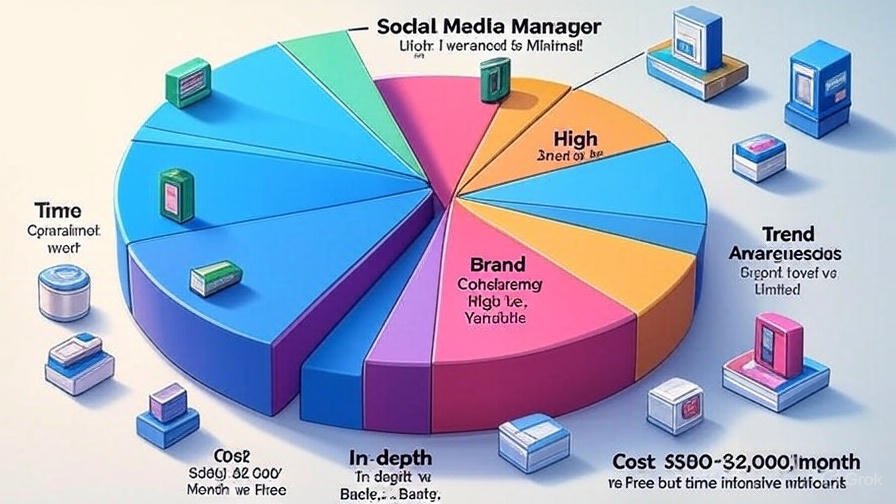
Introduction: Why Every Small Business Needs a Social Media Manager
Imagine this: It’s 2025, and your small business is buzzing with potential customers discovering your brand online. Your Instagram reels are going viral, your LinkedIn posts are sparking meaningful conversations, and your TikTok videos are driving sales. Sounds like a dream, right? This is the power of a skilled social media manager for small business. In today’s hyper-digital world, social media isn’t just a marketing tool—it’s the heartbeat of customer engagement, brand loyalty, and growth.
As a small business owner, you’re likely juggling a million tasks, from inventory to payroll to customer service. Adding social media management to your plate can feel overwhelming. Yet, with 97% of consumers researching businesses online before making a purchase, a strong social media presence is non-negotiable. A dedicated social media manager can transform your online strategy, saving you time while amplifying your brand’s voice.
In this 5,000-word guide, we’ll dive deep into the role of a social media manager for small business, exploring why they’re essential, how to hire or become one, and the strategies and tools that drive success in 2025. Whether you’re a café owner in a small town or an e-commerce entrepreneur, this post will equip you with actionable insights to thrive in the digital jungle. Let’s get started!
What Does a Social Media Manager for Small Business Do?
A social media manager for small business is more than just someone who posts pretty pictures on Instagram. They’re strategists, content creators, data analysts, and community builders rolled into one. Their role is to align your social media efforts with your business goals, whether that’s driving sales, building brand awareness, or fostering customer loyalty.
Core Responsibilities
Here’s a snapshot of what a social media manager does:
- Content Creation & Curation: Crafting engaging posts, videos, and graphics that reflect your brand’s voice. For example, a bakery might share behind-the-scenes videos of cake decorating to connect with customers.
- Scheduling & Publishing: Using tools like Hootsuite or Buffer to plan and post content at optimal times.
- Community Engagement: Responding to comments, DMs, and reviews to build relationships. Sprout Social’s 2025 Index notes that 68% of consumers expect brands to respond within 24 hours.
- Analytics & Reporting: Tracking metrics like engagement rates and conversions to refine strategies. Tools like Google Analytics help measure traffic from social media.
- Social Listening: Monitoring brand mentions and industry trends to stay ahead. For instance, a local gym might notice a surge in interest for yoga classes via Sprinklr’s Social Listening.
- Paid Advertising: Managing targeted ads on platforms like Facebook or TikTok to boost reach. A small business might spend as little as $50/month on ads with significant ROI.
- Strategic Planning: Aligning social media with business goals, such as launching a new product or entering a new market.
Why Small Businesses Need This Role

Social Media Manager for Small Business: The Ultimate Guide to Success in 2025
Unlike large corporations with dedicated marketing teams, small businesses often rely on one or two people to handle everything. A social media manager streamlines these efforts, ensuring consistency and impact. For example, a 2025 Social Media Examiner report found that 66% of small businesses saw increased sales after hiring a social media manager.
The Benefits of Hiring a Social Media Manager for Small Business
Investing in a social media manager for small business can feel like a big step, especially when budgets are tight. However, the benefits far outweigh the costs. Here’s why:
1. Saves Time and Boosts Efficiency
Running a small business is a 24/7 job. A social media manager takes the burden of daily posting, responding, and strategizing off your shoulders. Tools like SocialBee allow managers to schedule weeks of content in advance, freeing up your time for core operations.
2. Enhances Brand Consistency
A cohesive brand voice across platforms builds trust. A social media manager ensures your Instagram, LinkedIn, and TikTok profiles tell the same story. For instance, Mala the Brand, a Vancouver-based candle company, uses transparency and storytelling to create a unified brand identity, as noted in Hootsuite’s 2025 guide.
3. Drives Measurable Results
A skilled manager tracks key performance indicators (KPIs) like reach, engagement, and conversions. For example, a local coffee shop might use Meta Business Suite to see which posts drive foot traffic, optimizing future content.
4. Keeps You Ahead of Trends
Social media evolves rapidly. In 2025, trends like short-form video and AI-generated content dominate. A social media manager stays on top of these shifts, ensuring your business doesn’t fall behind. Deloitte’s 2025 Digital Media Trends highlight the rise of hyperscale social video platforms like TikTok.
5. Maximizes ROI on a Budget
Small businesses don’t need big budgets to succeed online. A social media manager can create high-impact content with minimal resources. For example, a $30/month Canva subscription can produce professional-grade visuals.
Table: Benefits of a Social Media Manager vs. DIY Approach

| Aspect | With a Social Media Manager | DIY Approach |
|---|---|---|
| Time Commitment | Minimal—manager handles all tasks | High—requires daily effort |
| Brand Consistency | High—unified voice across platforms | Variable—depends on your expertise |
| Trend Awareness | Expert-level—stays updated on trends | Limited—hard to keep up |
| Analytics | In-depth—uses advanced tools for insights | Basic—reliant on native platform data |
| Cost | $500-$2,000/month (freelancer/agency) | Free (but time-intensive) |
How to Hire a Social Media Manager for Small Business
Finding the right social media manager for small business is crucial. Here’s a step-by-step guide to hiring the perfect fit:
1. Define Your Goals
Before posting a job ad, clarify what you want to achieve. Are you focused on brand awareness, lead generation, or customer retention? For example, a retail store might aim to increase online sales by 20% in six months.
2. Decide Between Freelancer, Agency, or In-House
- Freelancer: Cost-effective ($30-$100/hour) and flexible. Platforms like Upwork connect you with skilled freelancers.
- Agency: Offers comprehensive services but is pricier ($1,000-$5,000/month). Agencies like SocialBee’s ConciergeBee are ideal for businesses needing full-scale management.
- In-House: Best for businesses with long-term needs but requires salary and benefits ($40,000-$60,000/year).
3. Look for Key Skills
A great social media manager should have:
- Content Creation: Proficiency in tools like Canva or Adobe Creative Suite.
- Analytics: Experience with tools like Sprout Social or Google Analytics.
- Communication: Strong writing and customer service skills.
- Platform Expertise: Knowledge of algorithms and best practices for Instagram, TikTok, LinkedIn, etc.
- Adaptability: Ability to pivot strategies based on trends or data.
4. Evaluate Their Portfolio
Ask for case studies or examples of past work. For instance, a manager who grew a local restaurant’s Instagram followers by 50% in three months demonstrates tangible impact.
5. Set a Budget
According to SocialBee, small businesses typically spend $500-$2,000/month on social media management, depending on scope and expertise.
6. Interview and Test
During interviews, ask:
- How would you create a content strategy for our business?
- What tools do you use to track performance?
- How do you handle negative comments or crises?
Consider a paid test project, like creating a week’s worth of posts, to gauge their fit.
Becoming a Social Media Manager for Small Business: A Career Path
If you’re an aspiring social media manager for small business, this role offers flexibility, creativity, and growth potential. Here’s how to break into the field:
1. Build Your Skills
- Learn the Basics: Take free courses on platforms like HubSpot Academy or Coursera.
- Master Tools: Get hands-on with Hootsuite, Buffer, Canva, and Google Analytics.
- Stay Updated: Follow industry leaders like Social Media Examiner or Sprinklr for trends.
2. Gain Experience
- Volunteer: Offer to manage social media for a local business or nonprofit.
- Freelance: Start with small projects on Fiverr or Upwork.
- Internships: Work with agencies to learn the ropes.
3. Create a Portfolio
Showcase your work on a personal website or platforms like Behance. Include:
- Sample posts for different industries.
- Analytics reports showing growth.
- Case studies of successful campaigns.
4. Network
Join online communities like LinkedIn groups or Social Media Examiner’s AI Business Society. Attend webinars or conferences to connect with potential clients.
5. Get Certified
Certifications from Hootsuite Academy or Facebook Blueprint add credibility.
Top Strategies for Social Media Success in 2025
Whether you’re hiring or managing your own social media, these strategies will help your small business shine:
1. Focus on Video Content
Video is king in 2025. Social Media Examiner’s 2025 report notes that 46% of marketers prioritize video. Create:
- Reels and TikToks: Short, engaging videos showcasing products or behind-the-scenes moments.
- YouTube Tutorials: In-depth content to establish authority. For example, a pet store could share pet care tips.
- Live Streams: Host Q&A sessions or product launches on Instagram or Facebook.
2. Leverage AI Tools
AI is reshaping social media management. Tools like Buffer’s AI Assistant generate captions, repurpose content, and optimize posting times. Sprout Social’s 2025 Index found that 97% of marketers use AI daily.
3. Prioritize Authenticity
Consumers crave genuine connections. Share your brand’s story, struggles, and successes. For example, Mala the Brand’s vulnerable post about low sales earned them media coverage and customer loyalty, as noted in Hootsuite’s blog.
4. Engage with Your Community
Respond to comments and DMs promptly. Use polls, quizzes, or user-generated content to boost interaction. Oatly’s TikTok strategy of engaging with comments has earned them over 600,000 followers, per Sprout Social.
5. Optimize Posting Schedules
Each platform has peak engagement times. Hootsuite’s 2025 guide suggests:
- Instagram: Noon on Fridays
- TikTok: Evenings, 7-9 PM
- LinkedIn: Weekday mornings, 9-11 AM
Tools like Metricool analyze your audience to find the best times.
6. Invest in Micro-Influencers
Infographic: Key Social Media Trends for 2025

Caption: Video content, AI tools, and authenticity dominate social media in 2025. Source: Social Media Examiner.
Top Tools for Social Media Managers in 2025
A social media manager for small business relies on tools to streamline tasks and maximize impact. Here are the top picks for 2025, based on Buffer’s 2025 list and Sprinklr’s guide:
1. Hootsuite
- Best for: All-in-one management.
- Features: Scheduling, analytics, social listening, AI-powered OwlyWriter.
- Pricing: Starts at $99/month.
- Why Use It: Ideal for businesses managing multiple platforms.
2. Buffer
- Best for: Simplicity and affordability.
- Features: Scheduling, basic analytics, AI assistant.
- Pricing: Free plan for 50 posts/month; paid plans from $22/month.
- Why Use It: Perfect for solo entrepreneurs.
3. Sprout Social
- Best for: Advanced analytics.
- Features: Social listening, customizable reports, unified inbox.
- Pricing: Starts at $249/month.
- Why Use It: Great for data-driven strategies.
4. Canva
- Best for: Visual content creation.
- Features: Templates for posts, videos, and infographics.
- Pricing: Free plan; Pro plan at $14.99/month.
- Why Use It: Easy-to-use design tool for non-designers.
5. SocialBee
- Best for: Small businesses.
- Features: Content categories, scheduling, analytics.
- Pricing: Starts at $29/month.
- Why Use It: Tailored for small business needs.
Table: Comparison of Top Social Media Management Tools

| Tool | Best For | Key Features | Pricing | Free Plan/Trial |
|---|---|---|---|---|
| Hootsuite | All-in-one management | Scheduling, analytics, AI | $99/month | 30-day trial |
| Buffer | Simplicity | Scheduling, AI assistant | $22/month | Free plan |
| Sprout Social | Advanced analytics | Social listening, reports | $249/month | 30-day trial |
| Canva | Visual content | Design templates | $14.99/month | Free plan |
| SocialBee | Small businesses | Content categories, analytics | $29/month | 14-day trial |
Challenges and Solutions for Social Media Managers
Even the best social media manager for small business faces challenges. Here’s how to overcome them:
1. Limited Budget
- Challenge: Small businesses often have tight marketing budgets.
- Solution: Use free tools like Buffer’s free plan or Canva’s free templates. Focus on organic growth through engaging content.
2. Time Constraints
- Challenge: Managers juggle multiple tasks with limited hours.
- Solution: Batch-create content and schedule posts using tools like SocialBee. Evergreen content, like how-to guides, reduces the need for constant creation.
3. Keeping Up with Trends
- Challenge: Social media evolves daily, from new platforms to algorithm changes.
- Solution: Subscribe to newsletters like Social Media Today and follow influencers on X for real-time updates.

4. Negative Feedback
- Challenge: Handling complaints or negative reviews online.
- Solution: Respond promptly and professionally. Sprinklr’s guide suggests turning negatives into opportunities by addressing concerns transparently.
5. Measuring ROI
- Challenge: Proving the value of social media to stakeholders.
- Solution: Use tools like Hootsuite to generate reports showing metrics like sales driven by social campaigns.
Case Study: How a Small Business Thrived with a Social Media Manager
Let’s look at a real-world example. Jane’s Boutique, a small clothing store in Austin, Texas, hired a freelance social media manager in 2024. Here’s what happened:
- Goal: Increase online sales by 30% in six months.
- Strategy:
- Created Instagram Reels showcasing styling tips.
- Ran targeted Facebook ads with a $100/month budget.
- Engaged with followers through polls and giveaways.
- Used Buffer for scheduling and Google Analytics to track traffic.
- Results:
- Grew Instagram followers by 40%.
- Boosted online sales by 35%.
- Increased website traffic from social media by 50%.
Jane credits her social media manager for turning her boutique into a local sensation. This case study, inspired by trends in Hootsuite’s 2025 guide, shows the tangible impact of professional management.
The Future of Social Media Management for Small Businesses
As we look to 2025 and beyond, the role of a social media manager for small business will continue to evolve. Here’s what to expect:
- AI Integration: AI tools will automate more tasks, from content creation to sentiment analysis. Sprout Social’s 2025 Index predicts 97% of marketers will rely on AI.
- Rise of New Platforms: Emerging platforms like Bluesky and Threads will gain traction, requiring managers to adapt strategies.
- Hyper-Personalization: Consumers will demand tailored content. Tools like HubSpot will help managers use CRM data for personalized campaigns.
- Sustainability Focus: Brands showcasing eco-friendly practices will resonate more. A social media manager can highlight these efforts through storytelling.
Conclusion: Take Your Small Business to New Heights
A social media manager for small business is your ticket to standing out in a crowded digital landscape. Whether you hire a freelancer, agency, or become a manager yourself, the strategies and tools outlined in this guide will set you up for success in 2025. From crafting viral videos to leveraging AI, the possibilities are endless.
Ready to transform your social media game? Start by defining your goals, exploring tools like Hootsuite or SocialBee, and engaging with your audience authentically. Share your thoughts in the comments below, or check out our related post on content marketing strategies for more tips. Let’s make your small business the talk of the town!
Call-to-Action: Have questions about hiring a social media manager? Drop them below, or sign up for our newsletter for weekly digital marketing insights!





